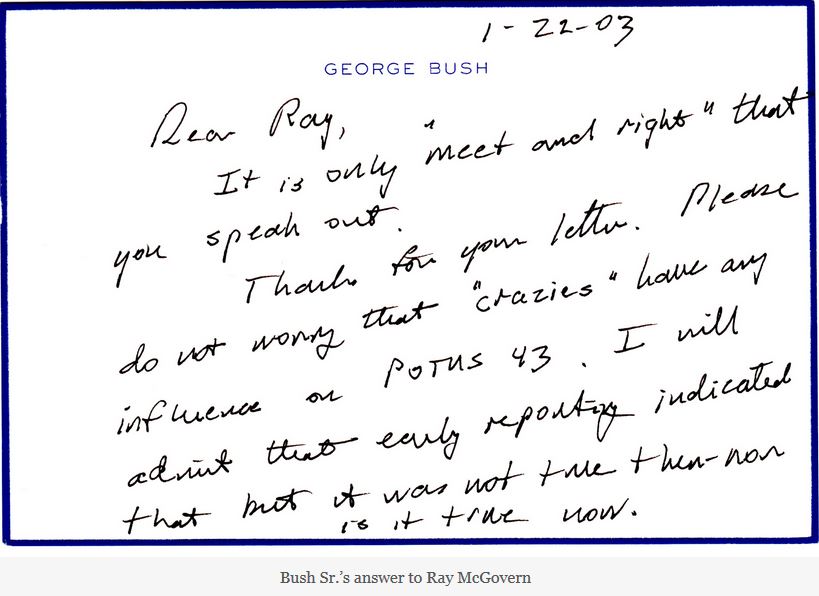What
Scowcroft Failed to Do
By Ray
McGovern
August 10, 2020 "Information
Clearing House" -
Some
of the praise being accorded the late Brent
Scowcroft is deserved. As national security
adviser to President George H. W. Bush, the
unassuming Scowcroft was a voice for relative
reason and moderation (compared to the
neoconservatives who would follow him), as the
USSR imploded and U.S. forces chased Saddam
Hussein out of Kuwait.
But few pundits
commenting on Scowcroft’s legacy are likely to
raise an awkward, but important, question that
haunts me. It is of such consequence that it
belongs in his obituary—and his eulogy.
Scowcroft knew the attack on Iraq was not only a
war crime but a reflection of insane hubris. Why
didn’t he join his voice to the 30 million
people in 800 cities who demonstrated against
the war on Feb. 15, 2003, five weeks before the
invasion?
Friends Don’t
Let Friends’ Sons Drive Drunk
I believe Scowcroft
badly served his friend George H. W. Bush on
Iraq by not doing all he could to stop Bush’s
son from committing a war of aggression — “the
supreme international crime” as defined by the
Nuremberg Tribunal.
|
No Advertising - No Government Grants - This Is Independent Media
|
Two years after the invasion, Scrowcroft told The New Yorker that Saddam Hussein “wasn’t really a threat. His army was weak, and the country hadn’t recovered from sanctions.” Colleagues pointed out that although Scowcroft was chairman of George W. Bush’s Foreign Intelligence Advisory Board, he was “frozen out” of planning for Iraq, as were Bush’s secretary of state, James Baker, and others.
From the neocon
viewpoint, it was essential to shut out anyone
with practical, strategic, legal, or moral
qualms about launching a pre-emptive war with
nothing to pre-empt.
Scowcroft had had
copious experience with “the crazies”, the
so-called “neoconservatives.” They’d gained
critical mass when Defense Secretary Donald
Rumsfeld and Chief-of-Staff Dick Cheney ran
President Gerald Ford’s White House. Scowcroft
had watched as Rumsfeld and Cheney maneuvered H.
W. Bush into what they thought would be a
dead-end job directing the CIA.
Then they sicced
the crazies on Director Bush in the form of the
infamous Team B, which did all it could to
exaggerate the Soviet threat. I worked for DCI
Bush in 1976; my colleagues and I did what we
could to help him stave them off. In the end the
Team B alarmists and their neocon descendants,
“the crazies”, got more of a hearing than they
deserved.
When he became vice
president, I gave Bush the early morning
briefings based largely on the President’s Daily
Brief from 1981-85. He and I had an unusually
longstanding professional and, later, cordial
personal relationship. For several years after
he left Washington, we stayed in touch — mostly
by letter.

On Jan. 11, 2003, as
the invasion of Iraq was gaining steam, I
wrote him a
letter asking him to speak “privately to your son
George about the crazies advising him on Iraq,”
adding, “I am aghast at the cavalier way in which
the [Richard] Perles of the Pentagon are promoting
the use of nuclear weapons as an acceptable option
against Iraq.”
My letter continued:
“That such people
have the President’s ear is downright scary. I
think he needs to know why you exercised such
care to keep such folks at arms length. (And, as
you may know, they are exerting unrelenting
pressure on CIA analysts to come up with the
‘right’ answers. You know how that goes!)”
His reassuring answer
not to worry about any influence the “crazies” might
have on his son was a big letdown.
The elder Bush may not
have been fully aware of it, but he was in the dark
whistling while leaving surrogates like Scowcroft
and Baker the task of publicly opposing the criminal
insanity of attacking and occupying Iraq. H.W. Bush
may or may not have tried privately, but it was a
tragedy he did not speak out publicly.
Could Scowcroft Have
Stopped the Invasion?
He didn’t try very
hard. There’s no doubt he saw it coming. He had to
be acutely aware that writing a Wall Street
Journal
op-ed “Don’t
Attack Saddam” on August 15, 2002 would not be
enough to stop the war, even though Baker wrote a
similar
op-ed in
The New York Times ten days later. Cheney
launched the juggernaut to war the next day with a
major speech greatly exaggerating the Iraqi threat.
After that, resistance from Establishment figures
petered out.
Scowcroft’s erstwhile
protege Condoleezza Rice, the younger Bush’s
national security adviser, made it abundantly clear.
The New Yorker
article
shows how Rice for whatever reason, she had drunk
what Cheney, Bush, and Rumsfeld were serving.
“Rice’s split with
her former National Security Council colleagues
was made evident at a dinner in early September
of 2002, at 1789, a Georgetown restaurant.
Scowcroft, Rice, and several people from the
first Bush Administration were there. The
conversation, turning to the current
Administration’s impending plans for Iraq,
became heated. Finally, Rice said, irritably,
‘The world is a messy place, and someone has to
clean it up.’ The remark stunned the other
guests. Scowcroft, as he later told friends, was
flummoxed by Rice’s ‘evangelical tone.’”
That was six months
before the invasion. It’s a pity that those who
perceived the impending catastrophe and had the
experience and credibility to shout that out,
limited themselves to op-eds and head-scratching at
Rice’s inanities.
Ray McGovern works
with Tell the Word, a publishing arm of the
ecumenical Church of the Saviour in inner-city
Washington. A 27-year CIA analyst, he served as an
Acting National Intelligence Officer in 1976 when
George H. W. Bush was Director of Central
Intelligence. When Bush became vice president, Ray
gave him the early morning briefings of the
President’s Daily Brief from 1981 to 1985.
-
"Source"
-
The
views expressed in this article are solely those
of the author and do not necessarily reflect the
opinions of Information Clearing House.
Post your comment below
The
views expressed in this article are solely those
of the author and do not necessarily reflect the
opinions of Information Clearing House. |
|
|
|

 |
Search
Information Clearing House
|
===
The views expressed in this article are
solely those of the author and do not necessarily
reflect the opinions of Information Clearing House.
|

